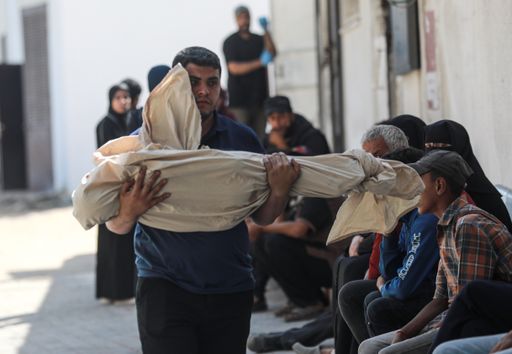Gaza is "the hungriest place on Earth", the United Nations said, warning that the Palestinian territory's entire population was now at risk of famine.
Negotiations to end nearly 20 months of war have so far failed to achieve a breakthrough, with Israel resuming operations in Gaza in March, ending a six-week truce.
"Gaza is the hungriest place on Earth," said Jens Laerke, a spokesperson for the UN humanitarian agency OCHA.
"It's the only defined area – a country or defined territory within a country – where you have the entire population at risk of famine. 100 percent of the population at risk of famine," he said on Friday, rejecting claims to the contrary by Israeli authorities.

'Catastrophic hunger’
At a press briefing in Geneva, Laerke detailed the difficulties faced by the United Nations in delivering humanitarian aid into Gaza.
In recent days, Israel has partially eased a total aid blockade on the Palestinian territory that it imposed on March 2, leading to severe shortages of food and medicine.
Laerke said 900 trucks of humanitarian aid had been authorised by Israel to enter the enclave since the blockade was partially lifted.
But so far only 600 trucks have been offloaded on the Gaza side of the border, and a smaller number of truckloads have then been picked up, due to multiple security considerations.
Laerke said the mission to deliver aid was "in an operational strait-jacket that makes it one of the most obstructed aid operations not only in the world today, but in recent history."
Once truckloads enter Gaza, they are often "swarmed by desperate people", Laerke said.
"I don't blame them, for one second, for taking the aid that essentially is already theirs - but it's not distributed in the way we want."
'Desperate and tragic'
The so-called ‘Gaza Humanitarian Foundation’ – a new organisation backed by Israel and the United States that emerged in early May – has been distributing aid at several sites across Gaza this week.
The organisation has faced accusations of helping Israel fulfil its military objectives while excluding Palestinians and failing to adhere to humanitarian principles of neutrality, impartiality and independence.
Asked about the foundation's operations, Laerke said: "It's not working. It does not meet the needs of people. It creates chaos."
Thousands of Palestinians rushed into a GHF centre on Tuesday, AFP journalists reported, as Israel implemented a new distribution system that bypasses the UN.
Laerke said that by having people collect aid rather than delivering it to them where they are, they become a target for looters once they leave the site.
"It is so desperate and tragic and frustrating and wildly unhumanitarian," he said.
In a statement, GHF claimed it had delivered two million meals in four days.
"Our commitment to safely and effectively supplying food directly to a large, hungry population is unwavering," its interim executive director John Acree said.
















